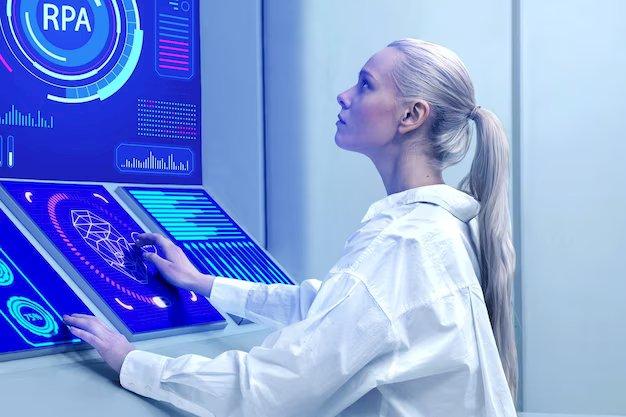AI in Healthcare: Revolutionizing Patient Care
Explore how Artificial Intelligence (AI) is reshaping healthcare, revolutionizing patient care from diagnostics to treatment. Discover the power of AI in enhancing medical diagnoses and improving administrative efficiency while navigating ethical considerations. Learn about the promising future of AI in healthcare.

Introduction
Artificial Intelligence (AI) has emerged as a transformative force in healthcare, promising to revolutionize patient care in ways previously unimaginable. With its ability to process vast amounts of data and make predictions, AI is not only enhancing medical diagnosis and treatment but also streamlining administrative tasks and improving overall healthcare efficiency. In this comprehensive guide, we will delve into how AI is reshaping the healthcare industry, from diagnostics to treatment, and explore its potential to improve patient outcomes and healthcare delivery.
Chapter 1: The Power of Data in Healthcare
The healthcare sector generates an enormous amount of data daily, from electronic health records (EHRs) to medical images and genomic information. AI harnesses this data to:
-
Enhance Diagnostics: AI algorithms can analyze medical images (such as X-rays and MRIs) with remarkable accuracy, aiding in the early detection of diseases like cancer and providing prompt diagnosis.
-
Predict Disease: Machine learning models can predict disease risk factors based on a patient's health history, genetics, and lifestyle, enabling proactive preventive measures.
-
Personalize Treatment: AI-driven systems help tailor treatment plans to individual patient needs, optimizing medication dosages and therapy choices.
Chapter 2: Telemedicine and Remote Monitoring
AI is making healthcare more accessible and convenient through telemedicine and remote monitoring:
-
Telemedicine: AI-powered chatbots and virtual assistants enable patients to access medical advice and information remotely, reducing the burden on healthcare facilities.
-
Remote Monitoring: Wearable devices equipped with AI can track vital signs and symptoms, sending real-time data to healthcare providers. This facilitates early intervention and reduces hospital readmissions.
Chapter 3: Administrative Efficiency
AI is not limited to medical diagnoses; it also helps improve the administrative aspects of healthcare:
-
Billing and Coding: AI streamlines the billing process by automatically assigning appropriate billing codes, reducing errors and speeding up reimbursements.
-
Appointment Scheduling: AI-powered systems can optimize appointment schedules, minimizing wait times for patients and maximizing healthcare providers' time.
Chapter 4: Drug Discovery and Development
AI accelerates the drug discovery process, reducing the time and costs involved in bringing new medications to market:
-
Drug Repurposing: AI algorithms identify existing drugs with potential new uses, expediting the development of treatments for various diseases.
-
Predictive Analytics: Machine learning models analyze biological data to predict how drugs will interact with the human body, improving the drug development pipeline.
Chapter 5: AI in Surgical Procedures
AI-assisted surgery is becoming more prevalent, enhancing the precision and outcomes of surgical procedures:
-
Robotic Surgery: Surgical robots, guided by AI, assist surgeons in performing minimally invasive surgeries with greater precision and less invasiveness.
-
Preoperative Planning: AI helps surgeons plan surgeries by analyzing patient data and creating personalized surgical strategies.
Chapter 6: Ethical Considerations and Patient Privacy
While AI offers tremendous benefits, it also raises ethical concerns related to patient privacy, data security, and bias. Healthcare organizations must navigate these issues carefully to ensure that AI technologies are used responsibly and ethically.
Chapter 7: The Future of AI in Healthcare
As AI continues to evolve, its role in healthcare is poised to expand further:
-
Genomic Medicine: AI will play a pivotal role in interpreting vast genomic datasets to guide personalized treatment plans.
-
Drug Delivery: AI-powered drones and smart devices may revolutionize drug delivery, especially in remote or disaster-stricken areas.
-
Patient Engagement: AI-driven virtual health coaches will motivate patients to adopt healthier lifestyles and adhere to treatment plans.
Conclusion
The integration of AI in healthcare is transforming the industry in profound ways, revolutionizing patient care from diagnostics to treatment and beyond. With AI's data processing capabilities, healthcare providers can deliver more accurate diagnoses, personalized treatment plans, and enhanced patient experiences. As the field continues to evolve, it is essential for healthcare organizations to embrace AI technologies responsibly, addressing ethical considerations and ensuring patient privacy. The future of healthcare is undoubtedly AI-driven, promising improved patient outcomes and a more efficient healthcare system for all.

 bloggeramar
bloggeramar 

































